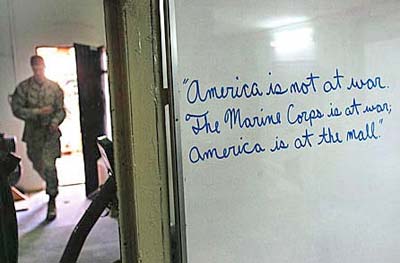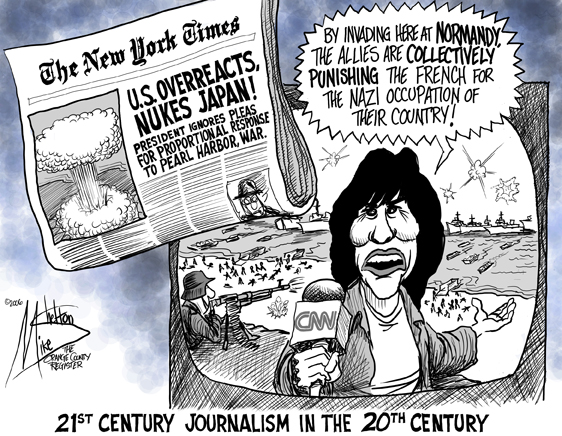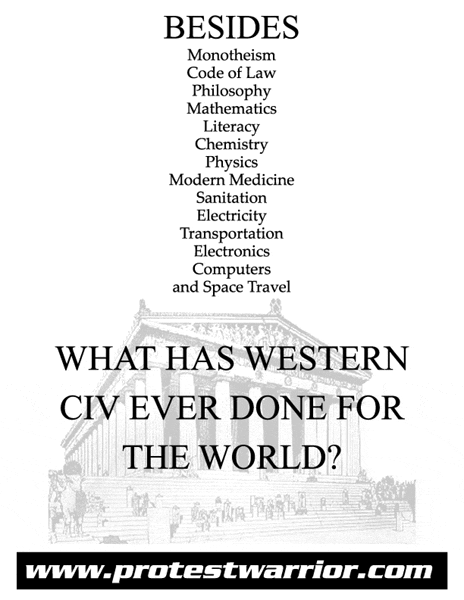
 | The Xenophile Historian |
THE HOLY BOOK OF UNIVERSAL TRUTHS,
K. U. P.
(Kimball's Unauthorized Perversion)

In previous wars, especially WWI and WWII, a declaration of war was followed by a total mobilization of society, and most civilians went along with it, because they were committed to winning. Women went to work in factories, often for the first time, to take the place of the men who had enlisted. Blackout curtains were put over windows, to make cities harder to see from enemy planes flying at night. Gasoline was rationed, people planted victory gardens, and they had meatless meals one day a week, to make sure there would be enough supplies available for the troops. The government encouraged its citizens to lend money for the war effort by selling bonds. The media did its part by producing movies and programs that made the troops look good, and the enemies look bad; there were no sympathetic interviews of leaders from the other side in those days, like the one Dan Rather had with Saddam Hussein. Today, however, I'm not seeing any of that. It makes you wonder how much we want to win, if we're sacrificing so little for the effort. In sports, is a team likely to win, if its players don't give it their all? Maybe that's why some barking moonbats claim that our enemies aren't really evil, or that there isn't really a war, except in places where the "neocons" started it.

I know what caused the manpower deficit that Ferguson found so alarming--soldiers aren't as cheap as they used to be. Here's what I said about it in Chapter 11 of my European history series:
"The Vietnam War was probably the last conflict where a recruiter would accept anyone who could walk and breathe. Since that time the price of ironmongery has jumped by leaps and bounds so that the typical tank costs more than $1 million, jet fighters and bombers can cost hundreds of millions, and an aircraft carrier costs so much in construction and maintenance that choosing its home port can decide whether a portside community will see prosperity or unemployment. In the age of electronic warfare weapons are getting fewer in number as they grow increasingly sophisticated, and that means only the most competent, best trained personnel will be retained to use them. To keep military budgets affordable, the United States and several other nations have 'downsized' their armed forces; a figure of 5 per 1,000 citizens is the current count of US military personnel, and even smaller figures may be possible as the twenty-first century progresses. That is probably the main reason why the US Army has succeeded as an all-volunteer force, despite the predictions of nay-sayers when the draft was abolished in 1973. We are now returning to a situation like that at the dawn of the modern era where the largest armies are fielded by the nations least able to equip them (e.g., China and North Korea, to name some present-day examples)."
From time to time I hear that our armed forces are meeting their quota of new recruits, despite the constant bad news from the war zones. Therefore I believe that if we increase defense spending, it will solve the manpower deficit as well as the financial deficit. In my opinion, the attention deficit will be our toughest challenge, because it's an intangible. Democracies have by habit gotten tired of wars sooner than other governments have. To give two examples, the British voted Winston Churchill out of office at the first opportunity, after World War II ended in Europe, and what killed us in Vietnam was that we weren't willing to stay for a long war; however, the Vietnamese were, because they had fought the Chinese on-and-off for a thousand years to win their independence. In other words, we seem to think that if a war isn't a short one, it's not worth winning. In Afghanistan our naive press started calling the conflict a "quagmire" after a few weeks of bombing runs, forgetting that in the 1990s we bombed Iraq and Yugoslavia for at least twice as long before we got results. They reminded me of a bunch of impatient kids on a trip who keep asking, "Are we there yet?"
What's more, both the press and the people in general seem to be ignorant of military history these days. The death of any of our servicemen is a tragedy, but casualties are a fact of warfare, and so far we have lost only a small fraction of the men we lost in Vietnam, Korea, both World Wars, or the American Civil War. Heck, at Antietam, D-Day, and Okinawa, we lost more lives in a single battle than we have so far in the entire War on Terror, and that includes the September 11 victims! Here are the body counts from past wars in US history:
American Revolution (1775-83) = 4,435
War of 1812 (1812-15) = 2,260
Indian Wars (dates vary) = 1,000 (estimated, only deaths in battle are counted)
Texas War of Independence (1836) = about 700
Mexican War (1846-48) = 1,733
Civil War (1861-65) = 364,111 Union, 133,821 Confederate (does not include the 26,000-31,000 Confederates who died in Union prisons)
Spanish-American War (1898) = 2,446
Philippine Insurrection (1899-1902) = 6,324
World War I (1917-18) = 116,516
World War II (1941-45) = 405,399
Korean War (1950-53) = 36,568
Vietnam War (1961-75) = 58,199
Persian Gulf War (1991) = 529
As you can see, in terms of casualties and the length of the conflict, so far the War On Terror ranks closest to the American Revolution. And, keep in mind that in those days, the United States had only three million people. For the War on Terror to have the same impact on our population as the American Revolution did, we would have to suffer almost half a million deaths.
In 2004, news anchor Ted Koppel spent an episode of "Nightline" reading a list of those killed so far in Iraq. Imagine if he had been reading the names of Civil War casualties! That would have taken him weeks, maybe months if he had breaks for eating or sleeping.
Speaking of the media, it also doesn't help that they are no longer on our side. In World War I we had Sgt. Alvin York, and in World War II we had Audie Murphy. Where are the heroes in the current war? I know they exist, but we only hear about them when they get killed by their heroic acts, like the marine who was recently in the news because he threw himself on a live grenade to save his buddies. And as for those killed in action, the only one whose name is commonly known is Casey Sheehan, because his mother is now a national embarrassment. As in Vietnam, the media gives us a daily tally of how many on our side have died so far, but hardly anybody seems to know how many terrorists have been killed. On top of that, in past wars our side was responsible for some atrocities and mishaps, like the bombing of Dresden, but they usually weren't given much attention until long after the war, while today the networks, newspapers, etc. play down the good news and trumpet relatively small incidents of misbehavior, like when guards made prisoners at Abu Ghraib go through the kind of humiliations that would be called "hazing" by college fraternities. That kind of reporting has taken its toll. Does anybody wonder why polls among Americans showed them 70 percent in favor of the Iraq war in 2003, and 70 percent against it in 2006?
Many bloggers and editorialists have discussed this point, by showing what we'd get if today's media had been around to report on previous wars. Here's one such satire, dealing with the D-Day invasion; the original author is unknown, alas.
The invasion also caused severe environmental damage. American troops, tanks, trucks and machinery destroyed miles of pristine shoreline and thousands of acres of ecologically sensitive wetlands. It was believed that the habitat of the spineless French crab was completely wiped out, threatening the species with extinction. A representative of Greenpeace said his organization, which had tried to stall the invasion for over a year, was appalled at the destruction, but not surprised. "This is just another example of how the military destroys the environment without a second thought, " said Christine Moanmore. "And it's all about corporate greed." Contacted at his Manhattan condo, a member of the French government-in-exile who abandoned Paris when Hitler invaded said the invasion was based solely on American financial interests. "Everyone knows the President Roosevelt has ties to big beer," said Pierre LeWimp. "Once the German beer industry is conquered, Roosevelt's beer cronies will control the world market and make a fortune."
Administration supporters said America's aggressive actions were based in part on the assertions of controversial scientist Albert Einstein, who sent a letter to Roosevelt speculating that the Germans were developing a secret weapon, a so-called "atomic bomb." Such a weapon could produce casualties on a scale never seen before and cause environmental damage that could last for thousands of years. Hitler has denied having such a weapon and international inspectors were unable to locate such weapons even after spending two long weekends in Germany. Shortly after the invasion began reports surfaced that German prisoners had been abused by Americans. Mistreatment of Jews by Germans at so-called "concentration camps" has been rumored but so far, remains unproven.
Several thousand Americans died during the first hours of the invasion and French officials are concerned that uncollected corpses pose a public health risk. "The Americans should have planned for this in advance," they said. "It's their mess and we don't intend to clean it up."
June 6, 1944. -NORMANDY- Three hundred French civilians were killed and thousands more wounded today in the first hours of America's invasion of continental Europe. Casualties were heaviest among women and children. Most of the French casualties were the result of artillery fire from American ships attempting to knock out German fortifications prior to the landing of hundreds of thousands of U.S. troops. Reports from a makeshift hospital in the French town of St. Mere Eglise said the carnage was far worse than the French had anticipated and reaction against the American invasion was running high. "We are dying for no reason," said a Frenchman speaking on condition of anonymity. "Americans can't even shoot straight. I never thought I'd say this, but life was better under Adolph Hitler."


Update #1: At the end of 2006 Islamists tried to take over Somalia, and Ethiopian soldiers and planes intervened to throw them out again. The Ethiopians succeeded because they did not care whether they were acting "politically correct." Who'd have thought that the United States would need help from one of the world's poorest countries to win a war?
Update #2: What would General Patton have to say to us about this war? Through video technology (and some help from George C. Scott and Mike Kaminski), the World War II hero comes back from the dead to tell us. Check out George S. Patton's New Speech on YouTube.
Support this site!